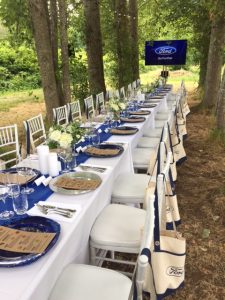
I recently enjoyed a delicious dinner at a long table between the trees at UBC Farm. It was a sustainability feast catered by Savoury Chef which took care of us all so well.
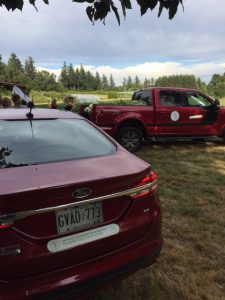
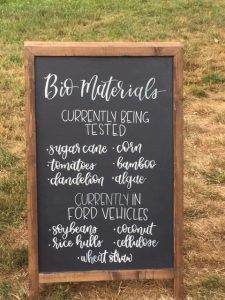
It has been many years since I have driven a Ford, pretty much in my various travels my rental car was a Ford and I don’t remember much else about it. Fast forward to this dinner, I had a chance to learn all about Ford’s sustainability plan and what they have done in the makeup/build of their vehicles as well as what is to come in the near future.
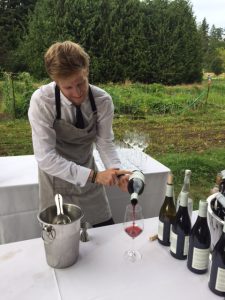
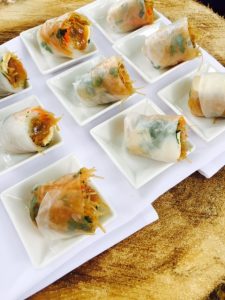
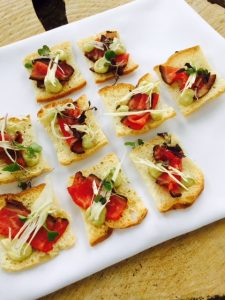
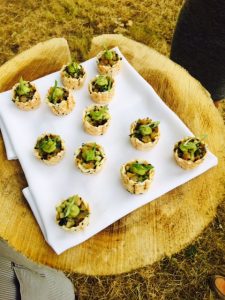
Dinner began with some passed canapes and Blue Mountain Pinot Noir 2014 wine which I loved.
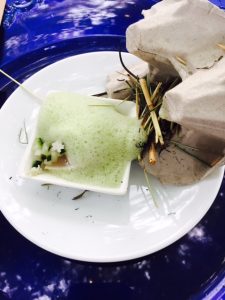
Tuna
I enjoyed the Tuna as my amuse (as I am not a fan of oysters).
1st course:
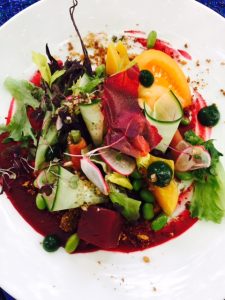
Garden Salad
Garden Salad with faux soil, organic greens, carrot, radish, cucumber, edamame beans, honey thyme vinaigrette
2nd course:
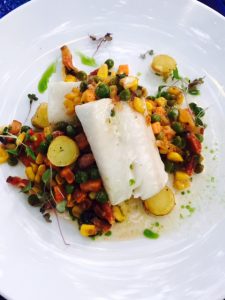
Roast line caught BC Sablefish
Roast line caught BC Sablefish with heirloom tomato, sweet corn fricassee, sweet potato and dashi espuma
3rd course:
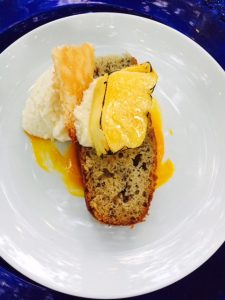
Roast Pineapple
Roast Pineapple and Bamboo shoots Rum mousse, with glazed mango
Matt Drennan-Scace of Ford Canada outlined all the Ford sustainability initiatives, I learned so much.
Currently in Ford Vehicles
Soybeans
It all started in the 1940s when Henry Ford built a plastic paneled car using soy – and had a soy suit to go with it!
Since 2011, all Ford vehicles built in North America have soy foam in their seat cushions and backs. This saves an estimated 2.3 million kilograms of petroleum per year. In addition, 85 per cent of headrests produced in North America and the headliner on the Ford Escape use soy foam. Ford continues to investigate new applications for soy foam, such as for underhood and energy-absorbing foams.
Rice Hulls
Ford uses renewable, natural-fibre materials to reinforce plastic and for other applications in vehicles. In 2014, Ford introduced a new composite plastic material reinforced with rice hulls (by-product of rice grains) in the wire harness of the Ford F-150.
Wheat Straw
Wheat straw-reinforced plastic is used in the storage bins of the Ford Flex – the world’s first application of this material. The use of wheat straw-reinforced plastics in the Flex reduces our petroleum usage by some 9,000 kilograms and our CO2 emissions by about 13,600 kilograms annually.
Coconut
Coconut coir, made from coconut husks, is used in the trunk mats of some vehicles, including the Ford Focus Electric.
Cellulose
In 2014, Ford launched an industry-first application of cellulose-reinforced plastic in the Lincoln MKX. This material is being used to replace fibreglass reinforcement in the centre console. The cellulose fibres in this composite come from sustainably grown and harvested trees and related byproducts. The material reduces weight by approximately 6 per cent. It also has a smaller carbon footprint than the glass-fibre-reinforced plastic it replaces, in part because it takes less time and energy to mold cellulose- reinforced parts than traditional glass-fibre-reinforced plastics.
Currently Being Tested
Sugar Cane
Sugar cane–based plastic has been made into interior fabrics and is being tested for durability and performance.
Tomatoes
Ford is collaborating with the H.J. Heinz Company to explore using tomato fibre, a byproduct of ketchup production, to develop a more sustainable bio-plastic material for our vehicles. Ford researchers are testing the material’s durability for potential use in vehicle wiring brackets and storage bins.
Corn
Agricultural corn by-product can be processed into plastic parts, fabrics, fibres or films. Ford is currently testing the product for potential uses in carpeting, upholstery and interior trim.
Bamboo
Bamboo is a fast-growing grass—up to 4 cm per hour!—that is being researched for potential uses in veneers and as filler material.
Algae
Algae is a promising sustainable material being researched by Ford. It grows very quickly, replicating up to four times per hour, and has a high per acre yield when compared to other crops.
Learn more about Ford and their Sustainability measures here.
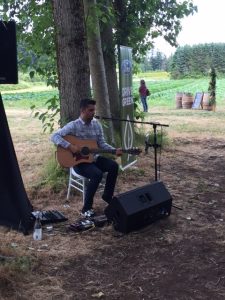
Loved the live music that we had a chance to enjoy throughout the farm dinner.
By: Richard Wolak
